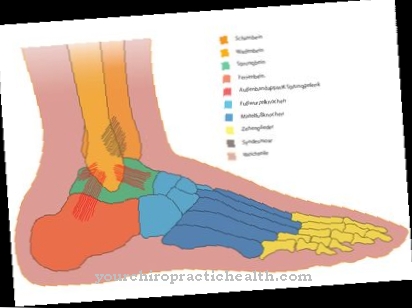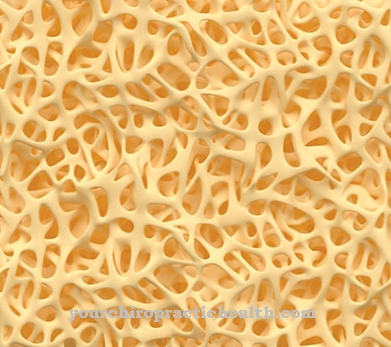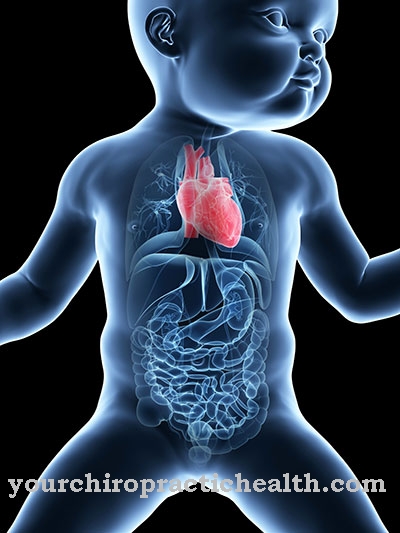The following explanations give an insight into the various causes, the diagnosis and the course of a Bloated stomach (med .: Meteorism). In addition, options for treating or preventing a bloated stomach are discussed.
What is a bloated stomach?

The colloquial word bloated belly describes a bloating of the stomach area to a spherical extent. This clinical picture is often called Gas belly and is usually associated with unpleasant pain for the person affected.
In addition to a bulging, thick body that feels very hard and reacts very sensitively to pressure, pain in the abdominal region and acoustic signals (gurgling, bubbling, gurgling) are among the most common side effects.
The pain quickly becomes a torture, especially for people in a sitting working position. The discomfort is also maximized by tight-fitting clothing.
causes
As different as the affected people are in character and characteristics, the causes of a bloated stomach are also very different. A heavy, high-fiber and fatty diet can be a trigger, as can persistent malnutrition or malnutrition.
This finding goes hand in hand with the fact that an excess of food intake cannot necessarily be responsible for a big belly. With this clinical picture, it may also be important to pay attention to which foods the person concerned consumes. Cabbage, salads and legumes are mostly known for their puffing effect.
But lactose, fructose or gluten can also trigger a gas stomach in those affected. If the patient still has a bloated stomach, despite the observance of all "eating regulations", he should also check his eating habits if necessary. Often, hastily swallowed food in combination with carbonated soft drinks or coffee can also trigger a gas stomach.
Typical diseases that show a puffy stomach as a symptom are: fructose intolerance, acute pancreatitis, Hirschsprung's disease and of course flatulence in general.
You can find your medication here
➔ Medicines for stomach ailments and painSymptoms, ailments & signs
Various gases are formed during the digestion process, including methane and carbon monoxide as well as fermentation and digestion gases. If the patient suffers from meteorism, these gases cannot escape naturally. Instead, there are a number of side effects that are not dangerous, but put a lot of strain on those affected.
A bloated stomach usually forms after eating fatty or bloating foods such as cabbage vegetables and legumes. Eating too quickly or food intolerance can also be the cause of the disorder. The intestinal gases that accumulate in the gastrointestinal tract then turn the abdominal wall outwards. The silhouette of the person concerned appears swollen.
In addition to flatulence, patients often suffer from feelings of tension and fullness, even if they have only eaten little. Severe abdominal pain, which can be accompanied by cramps or even colic-like attacks, is very common. In these cases, symptoms such as loss of appetite, nausea and vomiting often arise.
Other typical side effects are clearly audible bowel noises such as gurgling or bubbling. It is not uncommon for a flat stomach to be followed by an increased discharge of intestinal gases (flatulence), which can also be associated with involuntary loss of stool or diarrhea.
The physical symptoms of bloating are usually harmless, but those affected suffer emotionally. This is especially true in society, as bowel noises and the discharge of bowel winds are considered completely unacceptable, but those affected no longer have their body functions under control if they have a pronounced bloated stomach.
Diagnosis & course
Affected people usually see a doctor after the problem of the bloated stomach does not go away on its own for several days, the upper and lower abdomen appear swollen and hard and they suffer severe pain due to the bloating of the stomach area.
If nausea, diarrhea and vomiting are also associated with the clinical picture, a visit to a practice is inevitable. In most cases, a flat stomach is easy to diagnose for an experienced doctor and treatment can be initiated according to the cause (e.g. irritable bowel syndrome, food intolerance, eating habits, lack of exercise, histamine intolerance, lactose intolerance, fructose malabsorption).
Acute complaints usually last for several hours and which (especially in the case of chronic gastric gastric disease) may last for several days. The duration of the illness ultimately always depends on the triggering moment and the treatment measures.
Complications
People with a bloated stomach often suffer from an uncomfortable body feeling. You feel pressure in your body, but - due to social conventions - often cannot relieve it. The urge to let gases out of the body is suppressed.
This can make the symptoms worse. Especially at work, at social events and in public places, a bloated stomach can be very uncomfortable for those affected. The affected person often only concentrates on the inflated core, which can limit their physical and mental well-being as well as their general performance.
A bloated stomach is often associated with a feeling of tension and fullness and with pelvic pain. Bowel noises in the form of gurgling or gurgling can also occur. A badly bloated stomach can also be visible from the outside. Other complications can include irregular stool, diarrhea, nausea and vomiting.
If women suffer from bloating during their menstrual period, they usually suffer from abdominal complaints. It can lead to an irritable mood. Impatience and dissatisfaction can arise.
A bloated stomach can also become chronic. Often those affected also suffer from pain. Pain medication may be required. The pain relievers can lead to other complications such as vomiting, nausea, or headache.
When should you go to the doctor?
A bloated stomach is usually harmless and only causes discomfort for a maximum of a few days. Maybe the meal was too big or it was swallowed too quickly. However, if the gas is persistent, a doctor should clarify the cause. This is especially true if the flatulence persists for a long time, is very severe and affects the quality of life. Then under certain circumstances a serious illness can hide behind it.
In any case, the doctor should be consulted if, in addition to flatulence, other symptoms such as breathing difficulties, severe abdominal pain, diarrhea, chronic constipation, dizziness, chest pain or even heart oppression occur. Blood on the stool is also a warning sign.
In this case, the doctor should definitely be consulted in order to rule out possibly serious bowel diseases or colon cancer. A doctor visit is also necessary if the bloated stomach occurs in connection with other known diseases such as heart failure.
The observation that certain foods such as milk or cereals often lead to flatulence should prompt a doctor's visit. It could be a serious food intolerance.
In most cases, however, there will be harmless reasons even if the symptoms are severe. However, once the exact cause is known, the doctor can initiate appropriate therapy or give advice on a special diet to get rid of the annoying flatulence.
Doctors & therapists in your area
Treatment & Therapy
After consulting a doctor, the right medication often helps against the bloated stomach quite quickly. Especially in the case of an organic disease, the intake of digestive-supporting enzymes is often very effective.
Those affected who do not want to resort to pharmaceutical products can first examine their eating habits themselves and change them if necessary. For example, you should refrain from consuming pulses, alcoholic or highly carbonated beverages. Raw food, coffee or black tea are also not recommended for those affected.
After this first change (if necessary), various teas, for example made from anise, caraway, fennel, coriander or marjoram can help. Abdominal massages and heat also have a relaxing effect on the tissue, abdominal muscles and intestines, and long walks after eating have a similar effect in this context.
In the field of alternative medicine, the Schüssler salts number 6, number 9, number 7 and number 3 are also considered a tried and tested method against the gas belly.
Outlook & forecast
In most cases, bloating can be treated well. Often it is a reaction to a food intolerance. Anyone who suffers from bloating over a long period of time should check which foods are poorly tolerated or digested.
For those affected, the problem is unpleasant, but mostly harmless, unless there are symptoms such as nausea, stomach pain, circulatory problems or a feeling of weakness. In this case, it is advisable to consult a doctor, because a heart attack can hide behind such supposedly harmless symptoms.
In the absence of a serious medical condition, bloating has a good prognosis if foods that are responsible for the gas are omitted or reduced. Many women also complain of a bloated stomach just before their period. It is hormonal and disappears on its own after the menstrual period without treatment.
In addition, emotional problems can also be the cause of a bloated stomach. Most of the time, it will go away without further treatment once the problems or stressful situations have been overcome. However, those who suffer from a mental disorder usually need professional therapeutic support to improve their symptoms. Sometimes psychotherapy lasting several years may be necessary.
You can find your medication here
➔ Medicines for stomach ailments and painprevention
Unfortunately, bloating cannot always be avoided, but the likelihood of developing it is comparatively low if a few preventive measures are taken into account: People who tend to have a gas belly should season their dishes more with caraway, fennel or anise, for example and sauté vegetables gently.
Sufficient chewing of the food is also beneficial and also has a positive effect on the figure, as it makes you feel full earlier. In addition to sufficient exercise, you should also ensure that you drink enough fluids. It may also be of lasting help to keep a food diary. In addition, a lot of exercise and sport helps to avoid a flat stomach and possibly a feeling of fullness.
Aftercare
The need for follow-up care for a flat stomach is closely related to whether the symptom was caused by a one-off food intake event or illness. A bloated stomach caused by certain foods such as a high proportion of legumes or too much air swallowed while eating usually resolves spontaneously and does not require any aftercare.
If the bloated stomach had a disease value, the patient's general practitioner (or pediatrician) or internist can be asked for advice as part of the follow-up care after the disease has ended. In many cases, follow-up care can also be left to the person concerned.
If the bloated stomach is a recurring event that is caused by an intolerance or allergy, it is important to consistently avoid these foods. Dietitians or nutritionists can also provide help here when it comes to choosing food. Some foods can also be taken together with certain tablets in order to be tolerated.
One example here are lactase tablets for those with lactose intolerance. In this context, aftercare also includes ensuring a healthy diet, despite intolerance and the need to avoid certain foods, by ensuring the balance through alternative foods. If the bloated stomach was also associated with symptoms such as diarrhea, stool regulators such as psyllium husks also help in aftercare.
You can do that yourself
Eating behavior plays a major role in those affected. It should be eaten slowly so that not so much air is swallowed. Proper chewing is also important so that the food is salivated enough before it reaches the digestive tract. In order for this to work, you should eat attentively and calmly without distraction. Several small meals a day are often easier to digest than two or three large meals. A digestive walk after a meal is also often helpful.
Consumption of frequently bloating foods like cabbage, legumes, coffee, refined sugar, and carbonated beverages should be avoided. An allergy or intolerance to certain foods can also be responsible for flatulence. Therefore, a doctor should clarify this in this regard. If the flatulence causes pain, putting on a warm cloth or hot water bottle can help.
Special teas with fennel, caraway or aniseed help to relax the intestines. Fresh fennel also helps as a steamed vegetable. You can then drink the brew very well, refined with a vegan stock cube. A circular abdominal massage clockwise also helps in many cases.
If these tried and tested home remedies do not help, defoamers are available over the counter in pharmacies. These destroy the gas bubbles in the intestine and briefly create the longed-for relief.
A bloated stomach often occurs in stressful situations. Therefore this should be reduced as much as possible. Regular relaxation phases, for example with progressive muscle relaxation, can work wonders.




.jpg)



















.jpg)



